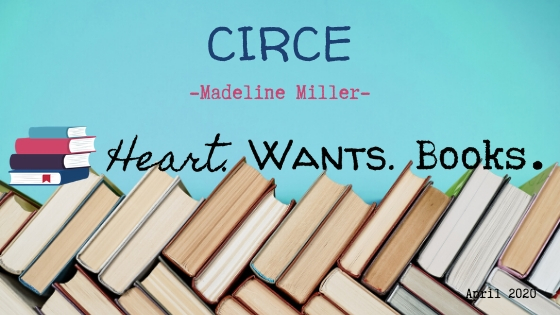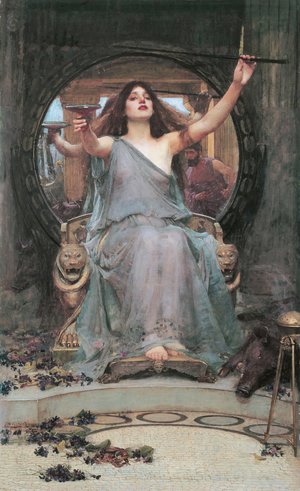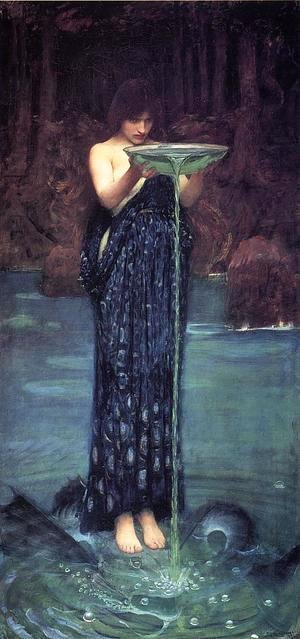Circe by Madeline Miller April 16, 2020

The following post includes affiliate links. More details here.

I finished reading Madeline Miller’s Circe several days ago, and I still don’t know what to say about this book. I want to pour through it again, and watch it on film, and then repeat the whole thing. The prose is JUST GORGEOUS, the story is creative, and somehow both gut-wrenching and uplifting. Although I wanted more from the ending (always, but there was NO EPILOGUE, NONE), it was glorious and perfect for the characters. If you think you know Circe as a character from studying mythology or from reading the Odyssey, you don’t, not until you read consume this novel. Miller doesn’t just introduce us to Circe as an individual being with a personality and a past and all the struggles of complex families we expect from Greek mythology, she peels back the layers and really lets us into the internal struggles, the motivations, and depth that just doesn’t exist (in my experience at least) in other sources. There are others we meet and get to know as well including her siblings and those who visit her island – yes, even Odysseus – who have a complexity I hadn’t been privy to before (Ashley may have had a different experience here having studied Latin and history) and it was an amazing experience.
It was fun to talk about with my 8 year old who adores Percy Jackson (although I wouldn’t hand this to him yet, perhaps in middle school). We discussed the different deities and characters who appear in Riordan’s works and in this text and how their portrayals were different because of the different perspectives.

Ashley and I have been careful what we’ve been reading during this public health crisis and chose this title intentionally. Yes, it’s been on our TBR list for a while, and yes, we’ve both read and loved The Song of Achilles, but we wanted a gorgeous novel that helped us to escape from reality and this delivered. It’s definitely a study in who Circe is that isn’t all sunshine and roses, but it has hope throughout, even in the end (sorry if you feel that’s a spoiler, it sort of is, but it also feels necessary right now). And dear readers, while we do love The Song of Achilles as well, now may not be the best time to pick up that title. So many of the descriptors of Circe also apply to that title, but let’s be real – we all know how The Song of Achilles ends. (If you don’t, ask Google, Alexa, or Siri, or message us, we’ll spoil privately upon request.) Put it on your TBR too, but wait for times that feel lighter than these to pick it up (also in this category Station Eleven by Emily St. John Mandel – yes, a thousand times yes, but not during a pandemic).
I’ll reread Circe at some point, when I need a lyrical, heartfelt, hopeful title that acknowledges the struggles of life and finds contentment in the end. I’m giving this title a solid 4 stars. It’s really good, only slightly out of range for a favorite of the year contender.
~Nikki

Madeline Miller, Brown University alumna with a BA and MA in Classics – be still my heart!- taught and tutored high school students in Latin, Greek, and Shakespeare for over fifteen years. She has also studied in the Dramaturgy department at Yale School of Drama, focusing on the adaptation of classical texts to modern forms. Her debut novel, 2012’s The Song of Achilles, won the Orange Prize for Fiction that year. Circe has won an American Library Association Alex Award, which is given to adult books of special interest to teen readers, in addition to being an instant number one New York Times bestseller, and numerous other accolades. Circe is currently being adapted as an 8 part series by HBO Max and was just released in paperback on Tuesday 14 April 2020! So, at some point, Nikki will be able to watch Circe to her heart’s content. I hope the Adams don’t get mad at our decision to subscribe to HBO so that we can watch what promises to be an excellent escape. [Nikki here: Ashley didn’t tell me, she let me read this and I would be mad but I’m too tired from working + homeschooling to be mad and excited, so I pick excited.]

Immortal daughter of the sun god Helios and the Oceanid nymph Perse, Circe’s greatest gift was in transformation. And transform things she did, a mortal into a god, a nymph into a monster, and, most famously, sailors landing on her island into swine, as she did to Odysseus’ men on his journey home from Troy. She learned the magic of herbs and the power of her own will to perform all manner of sorceries, both for the good of others and for selfish reasons as all people do. However, in the end, she comes to realize in herself something she had learned early in her exile on the island of Aiaia – that “transformation touched only bodies, not minds” – which means that the core of a being is never changed be it animal or human or god, it remains at the heart what it has always been.
Madeline Miller transforms the peripheral character of Circe in Odysseus’ story into a fierce and misunderstood heroine for modern times. We women, like Circe, must go to our ‘islands of exile’ and find within ourselves the will and power to change our own lives and the lives of others. I began to write that Circe ignored those who scorned and derided her during her whole life, but that would not be true. On many occasions throughout the novel she responded to those same hateful people – oftentimes her own family – with acceptance and compassion during their times of need -with barely even thanks in return. How often do we experience these situations in our own lives?

I have loved Circe since my high school (read: whole life) obsession with the art of John William Waterhouse – a Victorian, English painter of the Pre-Raphaelite style who exhibited work from 1874 until 1915 at the annual Royal Academy summer exhibition in London. He portrays Circe in 3 different paintings: Circe Offering the Cup to Ulysses – the moment when Ulysses (the Latin form of the Greek Odysseus) must show his hand to not be turned into a pig like his men, Circe Invidiosa – where we see her transforming Scylla into a sea monster, and The Sorceress – a homey scene where the pensive Circe is surrounded by her leopard companions, her loom, and her witchy decoctions. Each of these paintings depicts facets of Circe that we come to understand in the book, the powerful witch, the vengeful lover, and the lonely exile. Are they each not a piece of the whole of the character that reflects all our own hearts and personalities? This is what great art does, allows us to find reflections of ourselves in the stories so that we don’t feel so alone – something that is most poignant and true during this time of physical distancing.
I want to give Circe a 4.5 star review after percolating with my feelings and writing this blog post. It is definitely going to be a ‘book on the shelf’ purchase for me in the future, to sit among my copies of the Iliad, Odyssey, and Aeneid.
~Ashley


